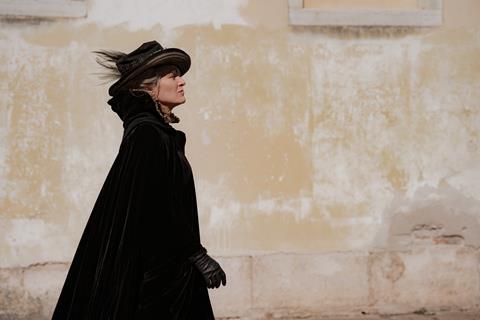Valeria Bruni-Tedeschi and Noémie Merlant star in Marcello’s Venice Competition title

Dir: Pietro Marcello. Italy/France. 2025. 123mins
Italian auteur Pietro Marcello has always been interested in the intersection between history and individual lives. His well-received and widely distributed Martin Eden showed a restless proletarian writer trying, and failing, to ride the bucking 20th-century as if it were a rodeo bronco. Scarlet (which opened Cannes’ Directors Fortnight in 2022), explored the impact of the Great War on a French rural village. His latest drama, which is based on the final years of great Italian theatre actress Eleonora Duse, makes an ambitious attempt to link the slow death of an old European theatre tradition with the rise of a new form of political theatre called Fascism (Mussolini even features in a couple of scenes).
A nuanced account of a woman trying to be true to her art
It’s an exercise the director and his co-writers don’t quite manage to pull off, but it still makes for an original, thought-provoking journey. Deeply cinematic, this is a film for historically-minded arthouse audiences who like a challenge. It may be hampered outside of Italy (where the film will be released on September 18) by the fact that Duse, who was the first woman ever to appear on the cover of Time magazine, is little remembered today, except by theatre history enthusiasts, and by its claustrophobic, airless style and tone.
Duse is former documentarian Marcello’s first film not to be based on a literary source since his 2015 fictional debut, Lost and Beautiful. Written with playwright Letizia Russo and story editor Guido Silei, the script is, on one level, a portrait of a capricious artist who is nevertheless utterly committed to her craft, to the exclusion of friends and family. That includes her emotionally needy daughter Enrichetta Marchetti (Noémie Merlant) who button-pushes the streak of cruelty running through her mother.
By the time we meet her, in early 20th century, Duse is turning 60 and has not performed on stage for a decade. She’s holed up in an ornate, stuffy Venetian palazzo, attended to by the awkward, highly-wrought Desiree (in an enjoyable performance, rising Hungarian actress Fanni Wrochna picks up on a comic vein bubbling under the surface, one that turns savage at times). Financial issues force Eleonora back onto the stage, where initial triumph is followed by humiliation when, stung by the criticism of fellow diva Sarah Bernhardt that she’s out of touch with the times, she insists on staging an absurd avant-garde piece by a young protegé, Memo (Vincenzo Nemolato).
There are obvious parallels with Pablo Larrain’s recent Callas biopic Maria, even in the casting of the central role. Like that film’s star Angelina Jolie, Valeria Bruni-Tedeschi brings a touch of her own diva-esque quality and reputation to what, in her hands, is a tremblingly intense but also nuanced and supple account of a woman trying to be true to her art in a world she is unable to adapt to. (That’s unlike the great love of her life, novelist Gabriele D’Annunzio, played by Fausto Russo Alesi, now a world-weary cynic perfectly prepared to be played by the new regime).
Duse is more raw than Maria, and demands more of its audience (including a willingness to research Eleonora Duse, as verbal or typographical context is refreshingly absent). Its period settings and costumes are lush, but also edgy. The drama-queen cloak Duse wears in several scenes has pleats of light grey-brown silk inside its high collar that look like folds of tripe. Marcello uses extreme close-ups to home in on spit, scrubbed skin and bad teeth. Even the soundtrack is counter-programmed: stirring classical pieces are cut in with a contemporary electronic score by a trio of Italian composers that lands somewhere between Vangelis and the Pet Shop Boys.
A series of colourised black-and-white sequences from Italian film archives are spliced into the action, but only viewers with a good grasp of the country’s inter-war history will know that the ceremonial train seen here, greeted by huge crowds as it makes its way through northern Italy to Rome, was bearing the coffin of the Unknown Soldier. This November 1921 tribute was arguably the last great national gesture of an older, nobler Italy before Mussolini – depicted here as a media-savvy 20th-century Machiavelli – ushered in a meaner small-town political mentality based on bullying, resentment, lies and poisonous gossip.
Production companies: Palomar (a Mediawan company), Avventurosa, with Rai Cinema and Piperfilm
International sales: The Match Factory, sales@matchfactory.de
Producers: Carlo Degli Esposti, Nicola Serra, Marco Grifoni, Benedetta Cappon
Screenplay: Letizia Russo, Guido Silei, Pietro Marcello
Production design: Carlotta Desmann
Editing: Fabrizio Federico, Cristiano Travaglioli
Cinematography: Marco Graziaplena
Music: Marco Messina, Sacha Ricci, Fabrizio Elvetico
Main cast: Valeria Bruni Tedeschi, Fanni Wrochna, Noemie Merlant, Fausto Russo Alesi, Edoardo Sorgente, Vincenzo Nemolato, Gaja Masciale, Vincenza Modica, Mimmo Borrelli
























